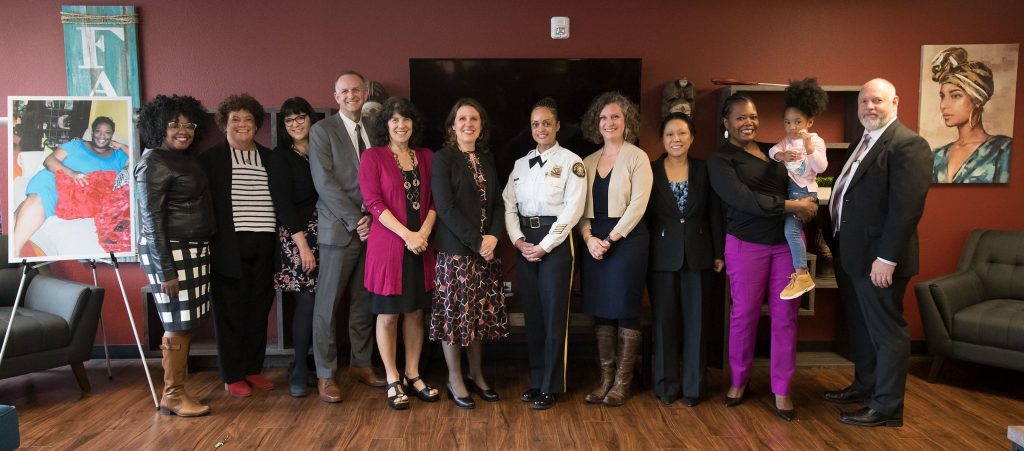
Diane Wade House Opening Ceremony on April 10, 2019 | Photography by Motoya Nakamura/Multnomah County
Everything from the art on the wall to the shampoo in the hair salon at the Diane Wade House in Gresham, Oregon, is designed with the needs of Black and African American women in mind. The Afrocentric transitional housing program for adult women involved in the criminal justice system in Multnomah County is funded by a $2 million grant from the John D. and Catherine T. MacArthur Foundation through its Safety and Justice Challenge, which is designed to reduce overreliance on jails across the country.
Data from the 2016 Multnomah County Relative Rate Index Summary reveal that although Black adults comprise only 5 percent of the general population in Multnomah County, they are 27 percent of the jail population. Black and African American women fare especially poorly, according to Abbey Stamp, executive director of the Multnomah County Local Public Safety Coordinating Council: those who are on probation are sanctioned to jail more frequently and stay longer than their white or male counterparts. Named for the late Diane Wade, a Multnomah County parole and probation officer and leader in the African American community, the Diane Wade House is designed to redress these disparities.
Opened in December 2018, the Diane Wade House offers low-barrier transitional housing and gender-responsive, trauma-informed services for up to 38 women. Bridges to Change, a local service organization, operates the program, which is run by peers with justice involvement. “We hosted a listening session with 12 African American women who had previous or current justice involvement to hear about their experiences with other transitional housing providers, their experiences accessing services in Portland, and the needs they believed should be addressed by a program like the Diane Wade House,” says Sarah Mullen, project manager with the Multnomah County Local Public Safety Coordinating Council. The programming, which includes culturally specific mentoring and life skills training and referrals to community services, was designed with this input in mind.
Residents of the Diane Wade House have a real need for mental health and substance use treatment, and it can be difficult to find such programs that are offered in a culturally responsive manner, Mullen explains. They also need assistance with family reunification and help in finding permanent housing. Though designed to house women for up to 120 days, many women stay as long as 6 months before transitioning into the community, Mullen says.
“Without the Diane Wade House and the groups, the classes for self-esteem and self-worth and them embedding in our minds that we are worth it, that we deserve to be happy, I wouldn’t be where I am today,” reports a recent graduate. “I am truly grateful.”
One of the programs that residents can participate in is called HEAT, which stands for Habilitation Empowerment Accountability Therapy. Based on a program created for African American men involved in the criminal justice system, HEAT has expanded across the country and has been adapted to meet the needs of Black and African American women in the justice system. The program is facilitated by corrections counselors and parole and probation officers and focuses on self, family, community, and spirituality. It is offered at both the Diane Wade House and the Coffee Creek Correctional Facility in Wilsonville.
For communities that might consider establishing a resource like the Diane Wade House, Stamp believes the key to replicating this first-of-its-kind program is in carefully parsing local data and needs. “This is what works for us in Multnomah County, but it might be different for other communities across the country,” Stamp explains. “What’s important is for folks who work in the justice system, or who are well versed in justice system reform, to really think about the places where the criminal justice system has created marginalized and injured communities because of over-policing and criminalizing public health problems.”
The Diane Wade House will continue to rely on the local community to help determine how best to meet the needs of Black and African American women involved in the justice system. The house will be guided by an advisory council made up of justice-involved women that will always include a current resident of the house, Mullen notes.
For more information about the Diane Wade House, contact Mullen at sarah.mullen@multco.us or (971) 219-4202.
Like what you’ve read? Sign up for the GAINS listserv!


